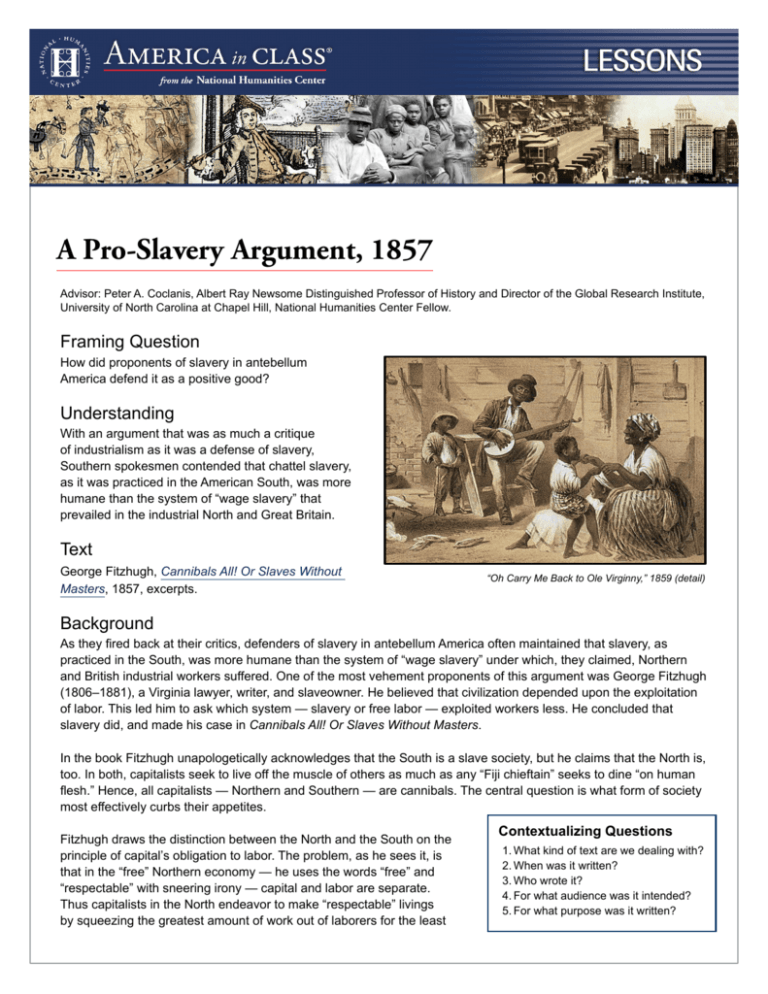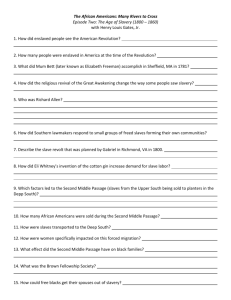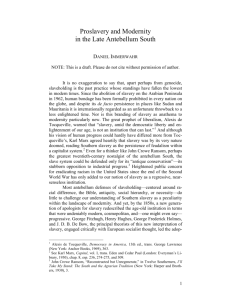A Pro-Slavery Argument, 1857
advertisement

A Pro-Slavery Argument, 1857 Advisor: Peter A. Coclanis, Albert Ray Newsome Distinguished Professor of History and Director of the Global Research Institute, University of North Carolina at Chapel Hill, National Humanities Center Fellow. Framing Question How did proponents of slavery in antebellum America defend it as a positive good? Understanding With an argument that was as much a critique of industrialism as it was a defense of slavery, Southern spokesmen contended that chattel slavery, as it was practiced in the American South, was more humane than the system of “wage slavery” that prevailed in the industrial North and Great Britain. Text George Fitzhugh, Cannibals All! Or Slaves Without Masters, 1857, excerpts. “Oh Carry Me Back to Ole Virginny,” 1859 (detail) Background As they fired back at their critics, defenders of slavery in antebellum America often maintained that slavery, as practiced in the South, was more humane than the system of “wage slavery” under which, they claimed, Northern and British industrial workers suffered. One of the most vehement proponents of this argument was George Fitzhugh (1806–1881), a Virginia lawyer, writer, and slaveowner. He believed that civilization depended upon the exploitation of labor. This led him to ask which system — slavery or free labor — exploited workers less. He concluded that slavery did, and made his case in Cannibals All! Or Slaves Without Masters. In the book Fitzhugh unapologetically acknowledges that the South is a slave society, but he claims that the North is, too. In both, capitalists seek to live off the muscle of others as much as any “Fiji chieftain” seeks to dine “on human flesh.” Hence, all capitalists — Northern and Southern — are cannibals. The central question is what form of society most effectively curbs their appetites. Fitzhugh draws the distinction between the North and the South on the principle of capital’s obligation to labor. The problem, as he sees it, is that in the “free” Northern economy — he uses the words “free” and “respectable” with sneering irony — capital and labor are separate. Thus capitalists in the North endeavor to make “respectable” livings by squeezing the greatest amount of work out of laborers for the least Contextualizing Questions 1.What kind of text are we dealing with? 2.When was it written? 3.Who wrote it? 4.For what audience was it intended? 5.For what purpose was it written? amount of pay, only to abandon them when they cease to be useful. In the Southern slave economy, on the other hand, “labor is capital.” Slaves, of course, do the work of the plantation, but they also represent a substantial capital investment. Owners pay dearly for them and thus it is in their best interest to “protect… not oppress them.” “When slaves are worth near a thousand dollars a head,” Fitzhugh writes, “they will be carefully and well provided for,” even when their working days are over. Unlike the Northern “slaves to capital,” “the negro slaves of the South are,” in his Activity: Vocabulary view, “the happiest and, in some sense, the freest people in Learn definitions by exploring the world.” how words are used in context. Text Analysis 1. [W]e not only boast that the White Slave Trade is more exacting and fraudulent (in fact, though not in intention) than Black Slavery, but we also boast that it is more cruel, in leaving the laborer to take care of himself and family out of the pittance which skill or capital have allowed him to retain. When the day’s labor is ended, he is free, but is overburdened with the cares of family and household, which make his freedom an empty and delusive mockery. 1. Fitzhugh uses the word “boast” twice in this paragraph. How might that word affect his pro-slavery readers? his anti-slavery readers? Test its impact by substituting other verbs: “maintain,” “contend,” “claim.” How do those verbs change the tone of the paragraph? 2. In the light of the Freedom’s Story essay on the slave family, how might you respond to Fitzhugh’s assertion that “cares of the family and household” deprive laborers of their freedom? 2. But his employer is really free, and may enjoy the profits made by others’ labor without a care or a trouble as to their well-being. The Negro slave is free, too, when the labors of the day are over, and free in mind as well as body, for the master provides food, raiment, house, fuel, and everything else necessary to the physical well-being of himself and family. The master’s labors commence just when the slave’s end. No wonder men should prefer white slavery to capital, to Negro slavery, since it is more profitable, and is free from all the cares and labors of black slave-holding. 3. What definitions of freedom are implied in Fitzhugh’s second paragraph? 4. Based upon Fitzhugh’s definitions of freedom, why are laborers not free? Why are employers free? Why are slaves free? Are the slave owners free? Why or why not? 3. The Negro slaves of the South are the happiest, and, in some sense, the freest people in the world. The children and the aged and infirm work not at all, and yet have all the comforts and necessaries of life provided for them. They enjoy liberty, because they are oppressed neither by care nor labor. The women do little hard work, and are protected from the despotism of their husbands by their masters. The Negro men and stout boys work, on the average, in good weather, not more than nine hours a day. The balance of their time is spent in perfect abandon. Besides, they have their Sabbaths and holidays. White men, with so much of license and liberty, would die of ennui, but Negroes luxuriate in corporeal and mental repose. With their faces upturned to the sun, they can sleep at any hour, and quiet sleep is the greatest of human enjoyments. “Blessed be the man who invented sleep.” ’Tis happiness in itself — and results from contentment with the present, and confident assurance of the future. We do not know whether free laborers ever sleep. They are fools to do so, for whilst they sleep, the wily and watchful capitalist is devising means to ensnare and A Pro-Slavery Argument, 1857 – A Close Reading Guide from America in Class 2 exploit them. The free laborer must work or starve. He is more of a slave than the Negro because he works longer and harder for less allowance than the slave and has no holiday, because the cares of life with him begin when its labors end. He has no liberty, and not a single right. 5. What image of slavery does Fitzhugh create paragraph 3? Cite specific evidence from the text to support your answer. 6. How does he portray capitalists? Cite specific words from the text to support your answer. 7. Compare Fitzhugh’s portrayal of slaves with that of free laborers. 8. In light of the Freedom’s Story essays on slave labor and slave resistance, how might you respond to Fitzhugh’s claim that “negroes luxuriate in corporeal and mental repose”? 4. But, reader, well may you follow the slave trade. It is the only trade worth following, and slaves the only property worth owning. All other is worthless, a mere caput mortuum [worthless remains], except insofar as it vests the owner with the power to command the labors of others — to enslave them. Give you a palace, ten thousand acres of land, sumptuous clothes, equipage, and every other luxury; and with your artificial wants, you are poorer than Robinson Crusoe or the lowest working man if you have no slaves to capital, or domestic slaves. Your capital will not bring you an income of a cent, nor supply one of your wants, without labor. Labor is indispensable to give value to property, and if you owned everything else and did not own labor, you would be poor. But fifty thousand dollars means, and is, fifty thousand dollars worth of slaves. You can command, without touching on that capital, three thousand dollars’ worth of labor per annum. You could do no more were you to buy slaves with it, and then you would be cumbered with the cares of governing and providing for them. You are a slaveholder now, to the amount of fifty thousand dollars, with all the advantages, and none of the cares and responsibilities of a master. Note: When Fitzhugh refers to labor giving “value to wealth,” he is referring to deriving income from capital. Only by investing capital — that is, buying labor with it — will capital generate income. When he refers to $50,000 commanding “three thousand dollars worth of labor per annum,” he is referring to the income that might be obtained from investing $50,000. 9. According to Fitzhugh, why does the purchase of labor turn an investor into a slave owner? 5. Public opinion unites with self-interest, domestic affection and municipal law to protect the slave. The man who maltreats the weak and dependent, who abuses his authority over wife, children or slaves, is universally detested. That same public opinion which shields and protects the slave encourages the oppression of free laborers — for it is considered more honorable and praiseworthy to obtain large fees than small ones, to make good bargains than bad ones (and all fees and profits come ultimately from common laborers) — to live without work by the exactions of accumulated capital, than to labor at the plough or the spade, for one’s living. It is the interest of Activity: Refuting Fitzhugh the capitalist and the skillful to allow free laborers Use first-hand evidence to write an argument the least possible portion of the fruits of their own from authority which refutes Fitzhugh’s three labor, for all capital is created by labor, and the primary claims for the humaneness of slavery. smaller the allowance of the free laborer, the greater A Pro-Slavery Argument, 1857 – A Close Reading Guide from America in Class 3 the gains of his employer. To treat free laborers badly and unfairly, is universally inculcated as a moral duty, and the selfishness of man’s nature prompts him to the most rigorous performance of this cannibalish duty. 10. According to Fitzhugh, why is the system of free labor more cruel than slave labor? A Pro-Slavery Argument, 1857 – A Close Reading Guide from America in Class 4 Glossary pittance: small, inadequate amount of money capital: In these excerpts, capital is used to mean (1) money as profit, accumulated wealth; (2) money invested to make money in business and finance; (3) the northern workingman’s employer, i.e., the northern capitalist-industrialist. delusive: deceptive, illusionary raiment: clothing infirm: enfeebled, disabled despotism: unjust and cruel authority; tyranny ennui: boredom; listlessness resulting from lack of interest corporeal: bodily cumbered: burdened inculcated: instilled, taught Image Credit “Oh Carry Me Back to Ole Virginny,” tobacco package label, lithograph by Robertson, Seibert & Shearman, New York, 1859 (detail). Library of Congress, Prints & Photographs Division, LC-DIG-ppmsca-08346. Courtesy of the Library of Congress. A Pro-Slavery Argument, 1857 – A Close Reading Guide from America in Class 5









